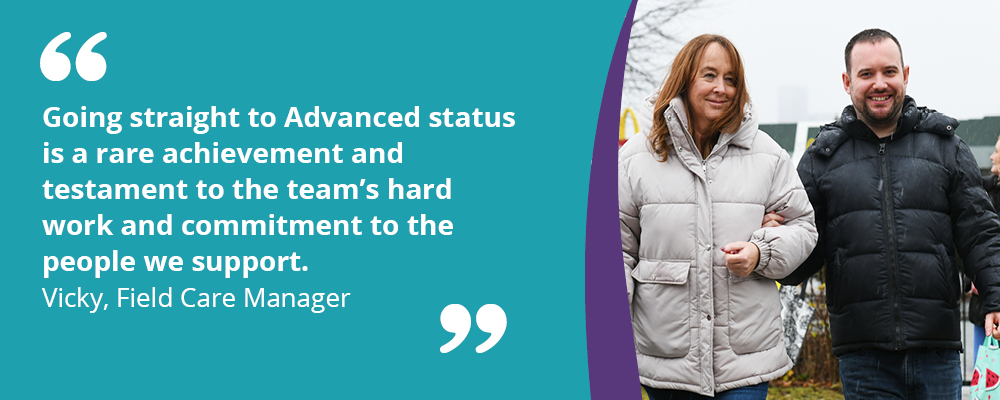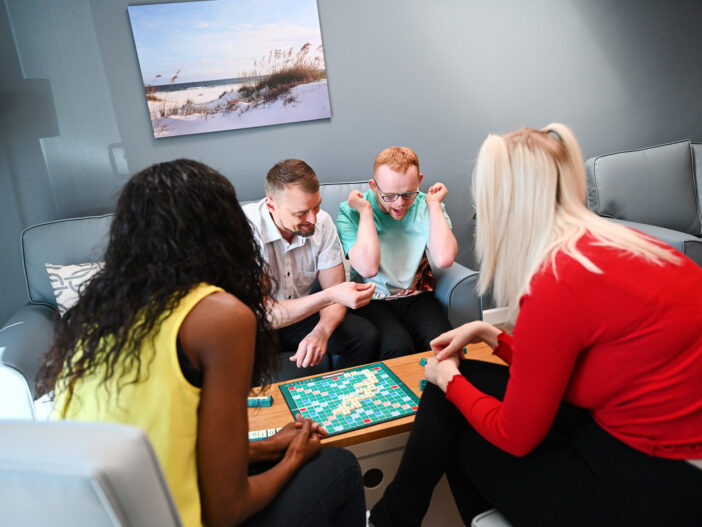Succeeding with advanced support at The Leam!
Being assessed by the National Autistic Society (NAS) is an exciting occasion for any of our specialist autism services. From initial accreditation, to achieving Advanced status, each stage is important in recognising the hard work and dedication of our teams.
When Cambridge based specialist autism service The Leam scheduled their initial NAS assessment, not only did they achieve their accreditation, but they went straight to Advanced status ! This achievement recognises the teams’ continued commitment and dedication to the people they support. The Leam have demonstrated that their support approach truly puts the people we support at the heart of everything they do, actively seeking out meaningful opportunities for them and empowering them to live incredible lives.
We caught up with Field Care Manager, Vicky Brown, to find out what was key to this incredible success!
Using person-centred support
At The Leam, we put the people we support at the heart of what we do and understand that everyone’s unique. Our person-centred support plans allow us to get to know them as people and build trusting relationships. By tailoring support to their individual needs, they’re empowered to create routines, participate in activities they enjoy, develop their skills, and live the lives they choose!
Building relationships also helps us support their communication preferences and how they interact with the world around them. This is important when introducing new activities or communicating changes to routine.
We adapt our communication approaches to each person, using a variety of visual aids and cues to help us communicate important information and changes, such as having visitors to the service.
Visual cues and aids might involve physical objects, pictures, and charts. These tools help the people we support process information easily and adapt comfortably to changes. We also introduced a staff photo board to show the people we support who will be on duty that day. This forms part of their routine and they check it daily, allowing changes to become more familiar to them.
Each person we support has their own visual activity planner, where they can schedule daily activities using symbols and pictures. It makes them aware of any changes, such as medical appointments, or visitors to the service. This gives them an opportunity to process these events before they happen.
One person we support uses a ‘now and next’ board. This is a visual planner that’s updated throughout the day. It helps them to understand how their activities are planned and encourages them to focus on one activity at a time. This person used to be possessive over particular household items, creating anxiety and challenging behaviour if another person was using the item. By introducing the ‘now and next’ board, the person we support has established more structure in their daily activities, reducing challenging behaviours and anxiety!
Creating a nurturing environment
As part of our person-centred support plans, we complete sensory assessments for each person we support. This gives insight into sensory preferences, and how each person experiences various sensory activities. Our team supports each person to participate in sensory activities, but also understands the importance of avoiding sensory overload. Taking the time to get to know each person individually helps us read their body language and use their behaviours to indicate whether something is working for them.
Sensory stimulation delivers many wellbeing benefits to our people with autism. We use sensory input to help the people we support feel happy and relaxed in unfamiliar situations. This empowers them to understand what might happen and what it could mean for them, physically and emotionally. At The Leam, we benefit from a fully equipped sensory room with apparatus specially chosen to meet the needs of the people we support.
The room evolves as their needs change. We’ve currently got a board with different fabrics as one individual enjoys feeling different materials, as well as sensory lights, music equipment, board games, and a permanently illuminated Christmas tree! This approach has empowered each person to tune in to their senses, recognising things that often change. This may include their meals or people they don’t see on a daily basis.

Support to stay active
Maintaining an active lifestyle is a key part of our autism support. We encourage the people we support to pursue activities they enjoy. This helps them develop physical and social skills, and work towards achieving their goals. Support plans are designed to maintain their wellbeing, and include activities they truly enjoy, which contribute to reducing stress and encouraging emotional balance.
Our community-based activities are varied, and we support individuals to access meaningful opportunities. Two people we support are engaged with a local day centre and have recently started to access a nearby leisure centre for swimming lessons. One of our ladies aspired to access the local nail bar and has now achieved this.
Another resident previously attended a learning disability church but, following the pandemic, this is temporarily shut. Once it reopens, we will support them to attend, if that’s what they wish to do.
With every activity, we aim to increase quality of life for each person, ensuring they can access the community in an inclusive way. We’re now looking to arrange a holiday for the people we support – it’s a big goal that’s important to them. This would be a great achievement for our team as well! At home, the people we support are encouraged to embrace independence and participate in household activities. Our various visual aids support them with these tasks. For example, in the kitchen, we have signs on the cupboards showing where different plates and dishes go. We are passionate about The Leam being a warm, safe environment for the people we support, so they truly feel at home.
Working at a steady pace
To monitor skills development and social activities, we keep ‘participation records’ and ‘meaningful engagement plans’ for each person. These give us insight into additional social support needs. Feedback from families and the people we support is important and we ask for their input on what’s working. From the feedback we modify support plans to ensure we’re meeting individual needs and providing the best possible care and support for that person.
Following the restrictions the pandemic brought, one person we support has struggled to resume their previous lifestyle. They have a mobility car and previously accessed the community independently. Their goal is to rebuild their confidence and start enjoying their favourite activities again!
To support this person in regaining confidence, we are using a method called ‘social stories’, plotting out one action at a time. The first step was to support them to feed the ducks at the front of the house, then pack their rucksack every day -mirroring what they used to do when visiting the local day centre. Now they’re at a stage where they place their rucksack in the car and return to the house. With verbal encouragement, and the support of visual aids, their progress has been amazing!
Find out more
If you would like to learn more about our supported living services and how we can support you, a loved one or a client, complete our quick and easy form, and a member of our team will be in touch.

 Quality & sector
Quality & sector 

